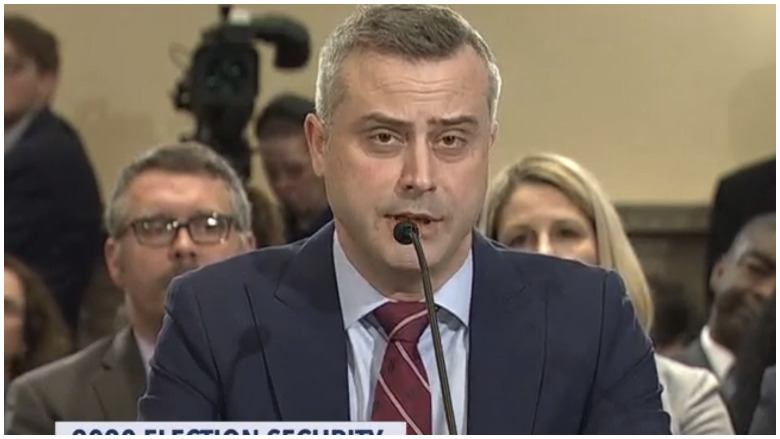
Dominion Voting Systems is an election services company from Canada that is responsible for the technology used to count votes in many of the close battleground states in the 2020 presidential election. Issues have arisen in some of those states, such as Michigan and Georgia, propelling Dominion into the spotlight.
Dominion Voting Systems is a company from Toronto, Canada, that has headquarters in Denver, Colorado, and is one of three major firms providing voting machines in U.S. elections.
A 2014 form filed with the State of California says Dominion was founded in 2003 in Canada and 2009 in the U.S. Its principal officers were listed then as John Poulos, CEO; Ian MacVicar, CFO; and James Hoover, vice president of product line management. Other articles say Poulos and Hoover are the co-founders.
President Donald Trump has also made claims against Dominion, writing on Twitter, “Report: Dominion deleted 2.7 million Trump votes nationwide. Data analysis finds 221,000 Pennsylvania votes switched from President Trump to Biden. 941,000 Trump votes deleted. States using Dominion Voting Systems switched 435,000 votes from Trump to Biden.” He provided no evidence.
However, USA Today reported that a national coalition has announced there “is no evidence that any voting software deleted or changed votes” in the 2020 presidential election. You can read the statement of that national coalition here.
The group “includes the Department of Homeland Security’s Cybersecurity and Infrastructure Security Agency and the National Association of State Election Directors” described the election as “the most secure in American history,” USA Today reported, quoting the coalition as saying, “There is no evidence that any voting system deleted or lost votes, changed votes, or was in any way compromised.”
Since the 2016 election especially, Dominion and other large voting firms have faced increasing Congressional scrutiny. It’s not unusual for big firms under the Congressional microscope to hire people or firms with ties to other power players; Dominion has ties to the Clinton Foundation. The company has used lobbying firms that employ lobbyists with ties to major figures like Georgia’s Republican governor and House Speaker Nancy Pelosi, as well as a lobbyist who donated money to Republican Majority Leader Mitch McConnell. Increasing the scrutiny, it has also worked with firms tied to George Soros and Robert Mueller and gets some components from China. A former ambassador named by former President Barack Obama sits on the board of a company that acquired it in 2018.
The company’s equipment is used in North Carolina, Nevada, Georgia, Michigan, Arizona and Pennsylvania – key states where President Donald Trump’s campaign has raised concerns or that are still being counted. The major television networks have called the election for former Vice President Joe Biden, but Trump has not conceded.
“The industry has a two-tier structure with the three top-tier vendors, Election Systems and Software, Hart Intercivic, and Dominion Voting Systems covering approximately 92% of the total eligible voter population,” a major 2017 study on voting companies by the Penn Wharton Public Policy Initiative said. Truthout reported that the company “was recently acquired by New York-based hedge fund Staple Street Capital.”
An executive board member of Staple Street Capital, William Earl Kennard, is a former ambassador to the EU who was appointed to that position by former President Barack Obama. In 2018, Dominion announced it had been acquired by its management team and Staple Street Capital. On November 6, Deadline reported that Kennard was named to the board of WarnerMedia parent AT&T, which owns CNN.
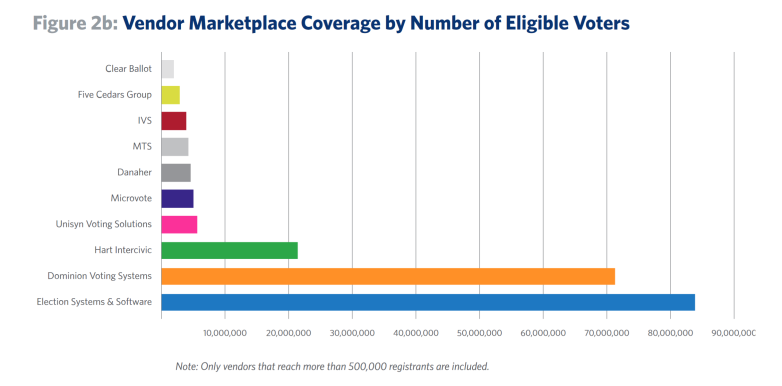
Penn Wharton study chart.
According to the Washington Examiner, Michigan Republican Party Chairwoman Laura Cox called on counties that use the Dominion Voting Systems software “to closely examine their result” after a glitch in a Michigan county erroneously gave Trump votes to Biden.
Here’s what you need to know:
1. Dominion’s Technology Serves 40% of American Voters; the Company Gave Money to the Clinton Foundation & Uses Some Parts From China
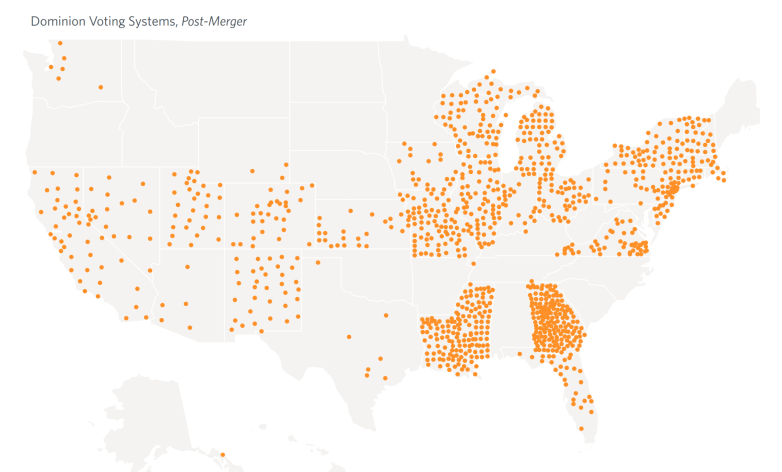
Penn Wharton study chart
Access Wire reported in 2017 that Dominion Voting Systems “is a Canadian company officially founded in the year 2000 with its headquarters in Denver, Colorado. Its founders are President and CEO, John Poulos and James Hoover.”
In January 2020, Poulos said in a written statement to the U.S. House that he was the “chief executive officer and co-founder of Dominion Voting Systems. As a U.S.-owned company, we currently provide voting systems and services to jurisdictions across 30 states and Puerto Rico.”
An old bio of Poulos says the following:
John Poulos is the founding President and CEO of Dominion Voting. Since its inception, John has been passionate about creating Dominion’s culture of transparency, accountability and technical innovation. John met James Hoover during a previous business venture in Silicon Valley where, together, they established an ambitious goal: to build a voting system that was so transparent, even the most skeptical critic would have confidence in its accuracy. Coupling this challenging objective with a culture of honesty, hard work and partnership in customer success has formed the foundation of Dominion’s success. Today, John enjoys spending most of his time soliciting and listening to feedback from clients, stakeholders and employees. He is happiest when spending time in Dominion’s offices after hours watching that feedback come to life in Dominion’s exciting and innovative next-generation products. John holds a Bachelor’s degree in Electrical Engineering from the University of Toronto, as well as a Master’s of Business Administration from INSEAD, Fontainebleau France.
An old bio says this about James Hoover:
James Hoover is a founding Vice President at Dominion Voting. Since its inception, James has worked to define and maintain Dominion’s sense of respect, responsibility, and commitment to all of our clients, voters, and the democracies we serve. Currently Vice President of Product Line Management, James defines the technical and operational standards by which Dominion operates, and drives Dominion in the relentless pursuit of quality and technology advancement.
James works closely with Dominion’s client services and sales teams, and along with Dominion’s engineers, he applies the company’s talent and leadership to answer customer needs; continually improving and enhancing Dominion’s innovative products and services.
James holds a Master of Science (MSc) in Mechanical Engineering from the University of Alberta.
Dominion Voting Systems has a web of links to companies tied to Washington power players.
A 2014 State of California document indicates Dominion’s agent of record at that time was Boston lawyer Michael Bevilacqua of Wilmer Hale. Former special prosecutor Robert Mueller works for that firm. Dominion earned $44 million in 2012, according to the form. It listed its addresses for manufacturing and development as Toronto; Belgrade, Serbia; Denver; Plano, Texas; and Baldwin Park, California. A 2020 filing lists their registered agent as Cogency Global in Florida. Its directors were listed as Hootan Yaghoobzadeh of Staple Street Capital, Stephen Owens, also of Staple Street, and Benjamin Humphreys. Yaghoobzadeh and Owens have past ties to the Carlyle Group investment firm.
The New York Times reported in June 2020 on issues in the Georgia primary. Dominion’s spokesperson “said the company had to replace only 20 components for 30,000 machines” in the Georgia primary, calling it “a very low number for a statewide voting system rollout across 159 counties.”
The Times reported that some Democrats in the Georgia Legislature opposed purchasing the system but there is “some evidence that heavy lobbying and sales tactics have played a role in their adoption in Georgia and elsewhere.”
Georgia alone has eight registered lobbyists for Dominion, and they include Lewis Abit Massey, a former Democratic Georgia Secretary of State, and Jared Thomas, former chief of staff for Republican Governor Brian Kemp, according to The Times.
According to Ellines.com, “He is a youth hockey coach and a mentor to young aspiring business students. He is an active member of YPO, and part of an alliance of Greek-Canadian entrepreneurs who share a common goal to preserve their heritage.”
Poulos was the face of the company before Congress, where he was peppered with questions about whether the company gets components from China.
During congressional testimony in January, Poulos said: “We do have components in our products that come from China. Our tabulated products have always been manufactured in the United States.” He said the Chinese components included “LCD components, the actual glass screen on the interface down to the chip component level…there’s no option for manufacturing of those in the United States. We would welcome guidelines and best practices.”
A 2019 report by the Brennan Center for Justice highlighted a lack of vendor oversight, raising Congressional concern about voting machines in general, according to The Associated Press.
What are the company’s ties to the Clinton Foundation? “Dominion Voting” is listed as a $25,000 to $50,000 donor to the Clinton Foundation in 2014 by The Washington Post.
According to the Clinton Foundation:
In 2014, Dominion Voting committed to providing emerging and post-conflict democracies with access to voting technology through its philanthropic support to the DELIAN Project, as many emerging democracies suffer from post-electoral violence due to the delay in the publishing of election results. Over the next three years, Dominion Voting will support election technology pilots with donated Automated Voting Machines (AVM), providing an improved electoral process, and therefore safer elections. As a large number of election staff are women, there will be an emphasis on training women, who will be the first to benefit from the skills transfer training and use of AVMs. It is estimated that 100 women will directly benefit from election technology skills training per pilot election.
The firm also hired a lobbying firm with ties to Nancy Pelosi’s former chief of staff.
According to Bloomberg, Dominion Voting Systems “hired … a high-powered firm that includes a longtime aide to Speaker Nancy Pelosi. … Dominion’s first-ever lobbying firm is Brownstein Farber Hyatt and Schreck. Nadeam Elshami, Pelosi’s former chief of staff, is one of the lobbyists on the account.”
The hire came as Congress was increasing scrutiny of election companies due to claims of Russian interference in the 2016 election.
“We want to make sure that we are telling the story of what Dominion is, and how deeply the company is invested in our mission, hopefully dispelling myths about our industry along the way,” Kay Stimson, vice president of government affairs at Dominion, told Bloomberg.
It’s not uncommon for major companies to try to curry favor with political leaders on both sides of the aisle. Brownstein Hyatt Farber and Schreck lobbyist David Cohen, “who lobbies for Dominion Voting Systems on issues related to election security and monitors federal legislation for the company,” gave Republican Senate Majority Leader Mitch McConnell’s campaign $2,000 in March, Truthout reported.
Poulos and the CEOs of other voting systems companies said they welcomed more federal scrutiny.
The Penn Wharton Public Policy Initiative published a major report that explored Dominion and other voting companies. The study noted difficulties in studying voting machines and companies, writing, “Part of the challenge in understanding the election technology industry is that it is difficult to compile even basic facts about it. The industry earns an estimated $300 million in revenue annually. … The industry is dominated by three firms that are moderate in size and neither publicly nor independently held, limiting the amount of information available in the public domain about their operations and financial performance.”
The study continued, “The seller side of the election technology industry has come to be characterized by a consolidated, highly concentrated market dominated by a few major vendors, where industry growth and competition are constrained.”
It says that Dominion acquired other companies to consolidate its position in the market.
Dominion is orange in this Penn Wharton map:
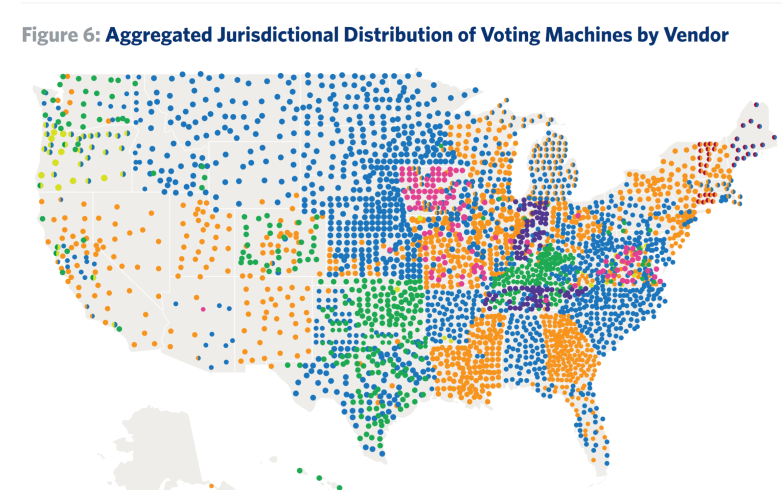
A map from the Penn Wharton study.
According to the company’s website, Dominion serves more than 40% of U.S. voters, including customers in 28 states and Puerto Rico and nine of the top 20 counties. The company says it has partnered with 1,300 jurisdictions. The map below shows where the company’s machines are used. This is the information the company gives about its work in key battleground states that were helping determine the presidential election:
Michigan: “Ranked the #1 system by a state review panel in 2018, 65 of 83 counties have chosen Democracy Suite.”
Georgia: “2020 statewide voting system rollout, with 33,000 ImageCast X BMDs, serving 159 counties.”
Arizona: “Serving 2.2 million Maricopa County voters with Democracy Suite 5.5 paired with the ImageCast X, ImageCast Precinct, and ImageCast Central.”
Nevada: “Designed for its Clark County debut in 2017, the ImageCast X with VVPAT now supports 16 of 17 Counties.”
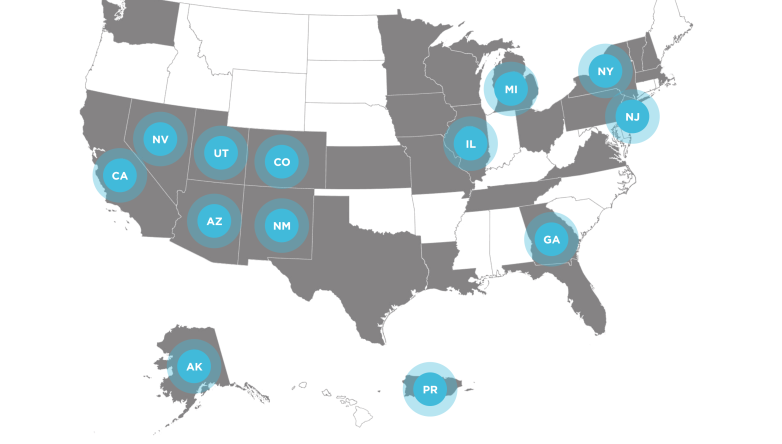
DominionVoting.com
Dominion’s website says: “Recognized by Deloitte as one of the fastest-growing tech firms in North America, Dominion provides the highest level of election support services available. From initial project implementation through election set-up, ballot layout, multiple language audio, machine set-up and system testing, we deliver. We also provide testing, Election Day support, training, preventative maintenance, project management and ongoing election consulting.”
Dominion denies any fraud allegations in a lengthy statement on its website, which you can read here. “Vote deletion/switching assertions are completely false,” the company says. “Dominion has no company ownership relationships with any member of the Pelosi family, the Feinstein family, or the Clinton Global Initiative, Smartmatic, Scytl, or any ties to Venezuela. Dominion works with all political parties; our customer base and our government outreach practices reflect this nonpartisan approach.” The company adds, “Claims about software updates being done the night before Election Day are 100% false.”
Sidney Powell, an attorney for Trump, has made a series of accusations against Dominion.
We reached out to the company to see if it wants to make comment on Powell’s claims specifically.
This was their response:
The gist it that some erroneous claims appear to be conflating Dominion with a different industry company called Smartmatic.
DOMINION IS NOT, AND HAS NEVER BEEN, OWNED BY SMARTMATIC.
Dominion is an entirely separate company and a fierce competitor to Smartmatic.
Dominion and Smartmatic do not collaborate in any way and have no affiliate relationships or financial ties.
Dominion does not use Smartmatic software.
he only associations the companies have ever had were:
– In 2009, Smartmatic licensed Dominion machines for use in the Philippines. The contract ended in a lawsuit.
– In 2010, Dominion purchased certain assets from Sequoia, a private U.S. Company. Smartmatic, a previous owner of Sequoia, pursued legal actions against Dominion.
On the Lou Dobbs’ program, Powell said,
I can hardly wait to put forth all of the evidence we have collected on Dominion, starting with the fact it was created to produce altered voting results in Venezuela for Hugo Chavez, and then shipped internationally to manipulate votes for purchase in other countries including this one. It was funded by money from Venezuela and Cuba and China has a role in it also…We have staggering statistical evidence.
As soon as the states stopped counting “the most egregious problems occurred,” Powell claimed.
She called the fraud “serious” and said machines were “producing altered election results…We are talking about hundreds of thousands of votes. President Trump won this election in a landslide. It’s going to be irrefutable.” Powell said “patriots are coming forward all day every day faster than we can collect their information” and said the machines were updated the night of the election and after the election. She said votes were “put in and replicated. There needs to be a massive criminal investigation, and it’s going to affect millions of voters and elections.”
She added that “changing a ballot” is a federal felony. She said Dominion has “been used all over the world to defy the will of people who wanted freedom.”
She said some governors and secretaries of state bought into the Dominion systems.
Powell and the Trump campaign have not proven her claims with evidence.
Powell’s Amazon.com biography says she was an Assistant United States Attorney “in three judicial districts under 9 United States Attorneys from both political parties. She represented the United States in 350 criminal appeals, and represented private parties in another 150, all resulting in more than 180 published decisions.”
The bio continues that she “was the youngest Assistant U.S. Attorney when she began practicing. She is an elected member of the American Law Institute, and the past president of the Bar Association for the Fifth Federal Circuit and the American Academy of Appellate Lawyers.”
Her website says she “established her firm, dedicated to federal appellate practice, in 1993. She is now practicing in the Second, Fourth, Fifth, Ninth, Tenth, and Eleventh Federal Circuits, and the United States Supreme Court.”
2. The State of Texas Rejected the Company’s Machines & Problems Arose With a Contracted Company in the Philippines That Has Ties to George Soros
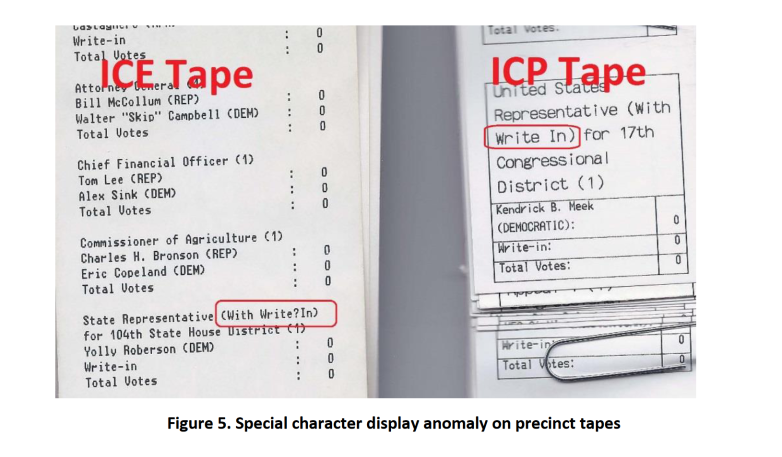
A screenshot from the Florida report on Dominion.
The State of Texas rejected Dominion in 2020 for use in its elections, writing:
The examiner reports identified multiple hardware and software issues that preclude the Office of the Texas Secretary of State from determining that the Democracy Suite 5.5-A system satisfies each of the voting-system requirements set forth in the Texas Election Code. Specifically, the examiner reports raise concerns about whether the Democracy Suite 5.5-A system is suitable for its intended purpose; operates efficiently and accurately; and is safe from fraudulent or unauthorized manipulation. Therefore, the Democracy Suite 5.5-A system and corresponding hardware devices do not meet the standards for certification prescribed by Section 122.001 of the Texas Election Code.
According to Center Square, the company “was rejected three times by data communications experts from the Texas Secretary of State and Attorney General’s Office for failing to meet basic security standards.”
Florida certified the company but noted some issues, including that the hyphen in “write-in” did not display properly on the precinct tabulator tapes, an issue the Bureau of Voting Systems Certification said did not affect voting machine operations or the scanning or counting of votes and was “of low impact and severity.”
The company also has been involved in elections overseas, and one in the Philippines was controversial.
According to Access Wire, “Dominion entered into a 2009 contract with Smartmatic and provided Smartmatic with the PCOS machines (optical scanners) that were used in the 2010 Philippine election, the biggest automated election run by a private company.”
Problems arose with source codes, according to ABS CBN News. One issue unearthed: “Commands to add, update and delete existing database records lack enclosing transaction logic which may affect database contents and may possibly result in database integrity and other corruption issues.”
Smartmatic’s chairman is a member of the British House of Lords, Mark Malloch Brown, a former vice-chairman of George Soros’ Investment Funds, former vice-president at the World Bank, lead international partner at Sawyer Miller, a political consulting firm, and former vice-chair of the World Economic Forum.
The Associated Press previously debunked false rumors saying that Soros owns Smartmatic voting machines. He does not, says AP. According to the AP, “the chairman of SmartMatics and the SGO Group, Mark Malloch-Brown, serves on the Open Society Foundations Global Board — founded by George Soros.” Smartmatic has previously had some involvement in U.S. elections, according to AP.
PBS ran a story about Windows operating system problems in some election software but noted that Dominion’s “newer systems aren’t touched by upcoming Windows software issues – thought it has election systems acquired from no-longer-existing companies that may run on even older operating systems.”
In 2014, there were issues in a New Brunswick election. Company vice president Hoover told The Globe and Mail the problem related to a “computer program configured to expedite the release of results to media servers and to the website of Elections New Brunswick.”
“Part of the communications protocol that we used in that system was an off-the-shelf piece of software. … We saw that component malfunction and we shut it down,” he told the publication.
3. In Georgia, a Vendor Upload Delayed Voting
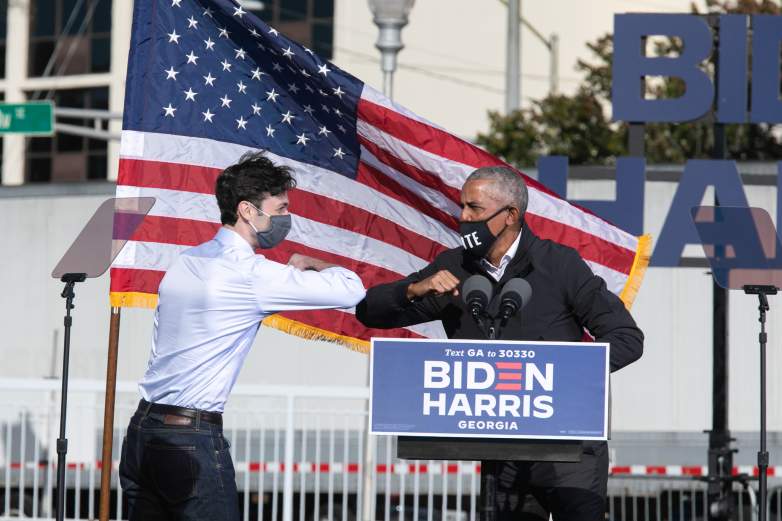
Former President Barack Obama gives an elbow tap to Democratic U.S. Senate candidate Jon Ossoff during a Drive-in Mobilization Rally to get out the vote for Georgia Senate candidates on November 2, 2020, in Atlanta, Georgia.
According to Politico, a “technology glitch” halted voting in two Georgia counties on Election Day because a vendor uploaded “an update to their election machines the night before.”
A judge extended voting to 11 p.m. after voters couldn’t vote for several hours in Morgan and Spalding counties due to the crash, Politico reported.
Dominion defended its work in Georgia, writing, “The Georgia Secretary of State’s office continues to publicly affirm that there are no widespread issues.”
According to Politico, the companies use “voting machines made by Dominion Voting Systems and electronic poll books … made by KnowInk.”
The companies “uploaded something last night, which is not normal, and it caused a glitch,” said Marcia Ridley, elections supervisor in Spalding County to Politico. “That is something that they don’t ever do. I’ve never seen them update anything the day before the election.”
According to CNN, a problem then arose in Gwinnett County, Georgia, an Atlanta suburb, over delays in reporting results. The county “was finally able to upload about 4,000 outstanding absentee-by-mail ballots, as well as re-run roughly 460 early voting ballots that had to be transferred from a ‘bad data card,’” CNN reported. The delay was caused by a technical issue “with the Dominion system used to upload to the Georgia Secretary of State’s office,” CNN reported. Dominion told CNN the situation “does not relate to system software and has had no impact on the accuracy of vote totals or tabulation.”
According to Business Insider, Georgia “became the only state in the country last year to overhaul its entire election system, paying Denver-based Dominion Voting Systems $106 million for new voting machines, printers and scanners.”
4. The Company Insists No Software Error Was Found in Michigan When Votes Flipped From Biden to Trump
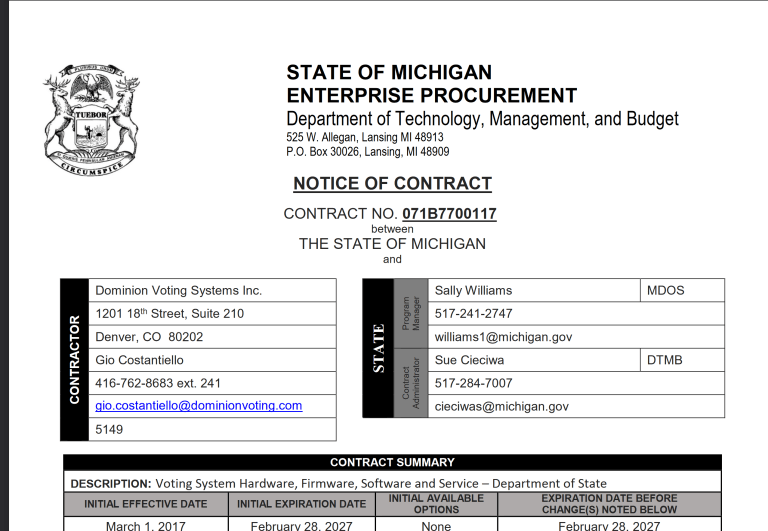
Antrim County, Michigan, a Republican stronghold, initially showed Biden winning but now says Trump was the victor there, according to the Detroit Free Press. (See Dominion’s Michigan contract here.)
The newspaper reported that the county clerk “failed to update election management system software used to combine the electronic totals from tabulators and submit a report of unofficial results,” causing the issue.
Dominion has a fact page that seeks to debunk viral rumors about its software. “All U.S. voting systems must provide assurance that they work accurately and reliably as intended under federal U.S. Election Assistance Commission and state certification and testing requirements,” the company insisted.
“There are no credible reports or evidence of any system software errors in Georgia or Michigan, including erroneous reporting of unofficial results from Antrim County, Michigan,” the company wrote in a press release.
Jocelyn Benson, the Secretary of State in Michigan, released a lengthy statement on what happened in Antrim.
“The error in reporting unofficial results in Antrim County Michigan was the result of a user error that was quickly identified and corrected; did not affect the way ballots were actually tabulated; and would have been identified in the county canvass before official results were reported even if it had not been identified earlier,” she wrote.
She confirmed that Antrim County “uses the Dominion Voting Systems election management system and voting machines (tabulators), which count hand-marked paper ballots. Counties use election management systems to program tabulators and also to report unofficial election results.”
She also wrote:
After Antrim County initially programmed its election software for the November Election, the county identified in October two local races where the ballot content had to be updated. The county received updated programming from its election programming vendor, Election Source. The updated programming correctly updated the election software for the county. When the software was reprogrammed, the County also had to update the software on all of the media drives that are placed in tabulators to ensure tabulators communicate properly with the election management system. The county did update the media drives that went into the tabulators with the corrected local races, but did not update the media drives on the tabulators for the rest of the county. Because the Clerk correctly updated the media drives for the tabulators with changes to races, and because the other tabulators did not have changes to races, all tabulators counted ballots correctly. However, because the county did not update the media drives for the tabulators that did nothave changes to races, those tabulators did not communicate properly with the County’s central election management system software when the county combined and reported unofficial results. Every tabulator recorded ballots correctly but the unofficial reports were erroneous. These errors can always be identified and corrected because every tabulator prints a paper totals tape showing how the ballots for each race were counted. After discovering the error in reporting the unofficial results, the clerk worked diligently to report correct unofficial results by reviewing the printed totals tape on each tabulator and hand-entering the results for each race, for each precinct in the county. Again, all ballots were properly tabulated. The user error affected only how the results from the tabulators communicated with the election management system for unofficial reporting. Even if the error had not been noticed and quickly fixed, it would have been caught and identified.
5. Dominion Voting Systems Denied Rumors That Sharpies Invalidated People’s Votes in Arizona, but There Were Problems With Sharpies in Pennsylvania in 2019
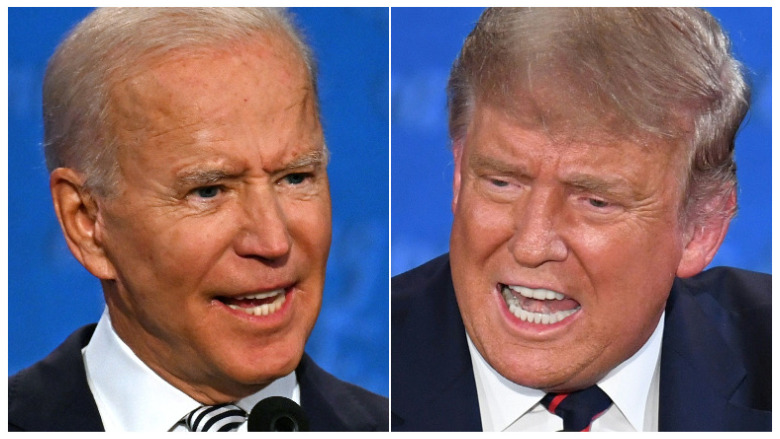
Getty
Dominion’s contract with Arizona is worth a lot of money. “The county has added on to the Dominion contract four times since it first formed its partnership in 2016. With this week’s addition, the contract with the Denver-based firm is worth $28.7 million,” Las Vegas Sun reported in September 2020.
Dominion denied rumors that voters in Arizona were given Sharpie pens to invalidate their ballots. “There are no issues with the use of Sharpie pens related to hand-marked paper ballots. Any reporting to the contrary is completely false,” Dominion wrote.
“Sharpie pens are safe and reliable to use on ballots, and recommended due to their quick-drying ink,” Dominion wrote in a news release. “Regarding potential ink bleed-through, Dominion’s systems never allow for the creation of ballots with overlapping vote bubbles between the front and back pages of a ballot. If you used a Sharpie provided by your elections office to complete your ballot, please know that your vote was accurately recorded.”
The company linked to a statement from local officials.
The Maricopa County Board of Supervisors wrote a letter to voters on November 4. “Sharpies do not invalidate ballots,” they wrote. “We did extensive testing on multiple different types of ink with our new vote tabulation equipment. Sharpies are recommended by the manufacturer because they provide the fastest-drying ink. The offset columns on ballots ensure that any bleed-through will not impact your vote. For this reason, sharpies were provided to in-person voters on Election Day. People who voted by mail could use sharpies, or blue or black pens. Our Elections Department has been communicating this publicly for weeks.”
However, problems arose with the felt-tip pens in 2019 in Pennsylvania.
Jefferson County started using Dominion systems and “poll workers reported problems with Sharpie markers bleeding through the paper ballots and causing them to be rejected,” WITF.org reported in 2019.
The site reported that poll workers were advised “to stop using the markers in favor of black pens packed in their equipment bags as a backup in case the Sharpies ran dry or extras were needed. Dominion had advised using permanent markers.”
Armstrong County Democratic Committee Chairman Steve Atwood told the site there were problems with Shapries in that county too because “…the markers bled through and voters had to redo their ballot. They’re small complaints, but I thought that was a big issue – if you have markers bleeding through, throw them out and use something that works.”
READ NEXT: What Is Kamala Harris’ Ethnicity?